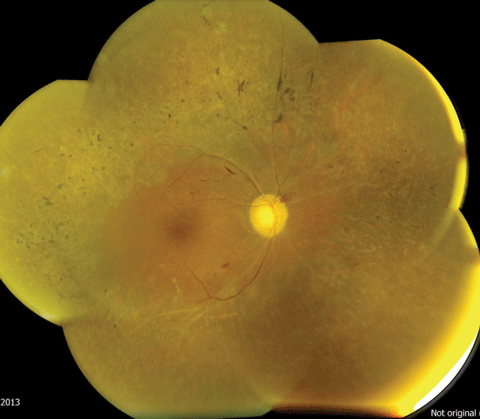In the first human test of optogenetics—a therapy combining gene therapy and light to control nerve cells—researchers at the Retina Foundation of the Southwest will be injecting DNA from light-sensitive algae into the eyes of patients deemed legally blind from retinitis pigmentosa (RP). The study aims to re-engineer the ganglion cells to respond to light and send signals to the brain, allowing patients to see, if only in blurry black-and-white.
 | |
| The pigment spiculing noted along the arcades and the “moth-eaten” retinal degenerative changes are indicative of retinitis pigmentosa. Photos: Mark T. Dunbar, OD | |
| |
The study will enroll as many as 15 patients with retinitis pigmentosa. The researchers hope the new therapy will allow them to see large objects, or even large letters.
But the therapy has its limitations, as the algae protein only responds to blue light. Researchers expect patients to have monochromatic vision, at best. Still, for blind patients to see even this much would be a huge leap forward.
While the new therapy could revolutionize treatment options for patients with RP, it may also have implications for other disease therapies. According to Antonello Bonci, scientific director of the intramural research program at the National Institute on Drug Abuse in Baltimore, researchers will need more information about which cells to target before it can be used for other diseases such as Parkinson’s and severe mental illness. “But that’s five years away, not 20 years away,” he said in a press release.
“We are hopefully getting closer to identifying another treatment option for RP patients who are at the end stage of the disease with bare to no light perception only. Optometrists should share this positivity and hope with their RP patients,” says Ava K. Bittner, OD, PhD, associate professor at Nova Southeastern University. “This clinical trial and a couple of other trials evaluating stem cells for RP are currently recruiting participants in the US, which is exciting since they offer current opportunities for some RP patients who wish to help researchers determine if these approaches might be useful to help improve and/or slow vision loss.”
source:REVOPTOM

